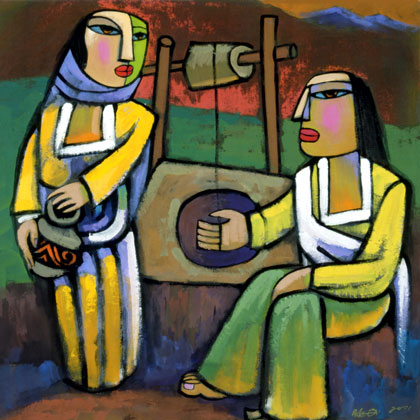(This is a sermon I gave at the Hermitage Retirement Home on the Gospel John 4:5-42.)
Mark Twain said “What gets us into trouble is not what we don’t know. It’s what we know for sure that just ain’t so.”
What we know for sure in the story of the Woman at the Well is that Jews and Samaritans don’t get along, that men and women can’t be fraternizing at well in first century Palestine, and that women shouldn’t be so easily married. That’s what gets us into trouble. This story isn’t about what you don’t know. It’s about what you know for sure that ain’t so.
Jews and Samaritans actually worshiped the same God and followed the same law passed down from Moses. They both claimed the first five books of the Bible, known as the Pentateuch, as their own. But that’s where it ends. They don’t share the same histories, the same poetry, or the same prophesies because each one claims that the other doctored the books to make them look bad.
The bad blood started when the Southern tribes of Israel, who later become the Jewish people, and the Northern tribes of Israel, who later become the Samaritans, were released by the Persians to return to their homeland. The Jews began rebuilding the temple in Jerusalem, and the Samaritans, believing they were their brothers and sisters, offered to help. But, you see, during the captivity, the Assyrians relocated several other conquered peoples to the northern tribes and as time went by, they intermingled by marriage and through worship.
The Jews of the Southern tribes did not intermingle. They remained pure. So they did not welcome the Samaritans as their brothers and sisters. They called them apostate, dirty, unclean, impure. They threw them out of Jerusalem and barred them from the temple, even as they offered to help. So what did the Samaritans do but build their own temple on another holy mountain, Mt. Gerizim, where Abraham nearly sacrificed Isaac and where they claimed Moses told them to worship.
And thus the feud began for whose side God was on.
The Jews knew for sure that they were right and that God was on their side. So anything associated with a Samaritan was unclean. Jews didn’t eat Samaritan food or use Samaritan bowls or cups. While even Gentiles were allowed in the temple of Jerusalem, Samaritans were not because they would vandalize the place. And the road between Jerusalem and Galilee was treacherous because it ran straight through the heart of Samaria. It was better to go around the bad neighborhood than through it.
Of course, the Samaritans knew for sure they were right, too, and they steadfastly worshiped the God of their father Jacob on Mt. Gerizim. God had to be on their side. They resented the Jews for treating them like second-class citizens. It was not unusual for Jews using the road between Galilee and Jerusalem to fall to Samaritan thieves. An arrogant Pharisee was a perfect target for a Samaritan who hated being called a half-breed to his face.
Why Jesus chose the direct route from Jerusalem to Galilee, straight through the heart of Samaria, we’ll never know. It took three days. Devout Jews and religious leaders would need to bring food and water for the journey. Jesus and his disciples did not. It is implied that they needed to leave Jerusalem quickly because the religious leaders were concerned that his disciples were baptizing more people than John the Baptist. Maybe they didn’t have time.
Still, they could have taken the long way around (approximately six days), avoiding the dangers and angry Samaritans. But they don’t. So midday, in the heart of a territory where they should not be, the disciples leave a hungry, tired, and thirsty Jesus alone to rest by Jacob’s Well while they search for food in the nearby town.
A lone Samaritan woman approaches. She has a bucket. Jesus does not. There is no one else around. The only way for Jesus to get water was with her bucket – her unclean, apostate, Samaritan bucket.
So he asks.
Now what we know for sure is that he should not have asked. Men were not permitted to speak to women in public. Rabbis weren’t even permitted to speak to their wives or daughters in public. There was an entire group of Pharisees known as the Blind Pharisees, who walked in town with their eyes always turned away, so as not to accidentally look upon a woman. (They were also known as the Bruised and Bleeding Pharisees because they couldn’t see where they were going and tripped over everything.)
Jesus acts as if he doesn’t know – he lets go of what he knows for sure and asks for a drink of water. I imagine that the woman at the well looked to her left and then to her right to make sure he wasn’t talking to anyone else. No one else was there. She knows for sure he’s a Jew and a male and that he should not be talking to her at all, let alone asking to drink from her Samaritan bucket.
So she calls him on it: “You really want something from me? Riiiiight.”
But Jesus doesn’t answer the question directly. He talks about living water that he claims to have that he can give to her – water that will quench her thirst forever. She’s still looking at a thirsty man who claims to have magic water that stops all thirst. I’m sure she thought he was delirious from the heat.
“Yeah, you just give me some of that water that you have all this access to. I’m the one with the bucket, dude.”
What she thinks she knows for sure is that he’s talking about spring water, which is the same word here as living water.
But that ain’t so.
She doesn’t pick up on it, doesn’t understand, just like Nicodemus didn’t understand what being born again means, just like the disciples didn’t understand that Jesus didn’t have real food, just like the Pharisees didn’t understand that Jesus was talking about himself when he said the temple to be destroyed and raised up again in three days. Jesus is speaking in riddles and a woman alone at a well in the heat of the day doesn’t have time to stick around and play games with a crazy man.
Then he asks her to bring back her husband.
She answers him. She has no husband.
What we know for sure is that she didn’t have to answer him at all. She knew Jews hated Samaritans. She knew it was disrespectful and humiliating for him to address her in public. She knew for sure he was talking about water he did not have – or he wouldn’t be asking her for water.
Jesus doesn’t aim for her Samaritan heritage or her gender, he aims at her heart and she takes the bait only to discover he is neither crazy nor arrogant. He is so much more.
Here’s what we know for sure: The woman has had five husbands and the man she has now is not her husband. But be careful about what you know for sure that isn’t so.
Nowhere in this passage does Jesus say she has sinned – the same Jesus who didn’t hesitate to clear the Jerusalem temple of money changers just two chapters before.
We don’t know why she was at the well in the middle of the day rather than the evening when it was cooler and much more crowded. It could be that she was running late, or it was dry season and the spring or well she normally used had run out. Nowhere does it say she is loose or promiscuous or living in sin, and that she was avoiding the wagging tongues of the other townspeople by choosing a time when the well was empty.
Yes, she had five husbands, but that could have happened in a myriad of ways. She could have had the terrible misfortune to be widowed many times, unusual, but not unheard of in first century Palestine. Her husbands could have given her a writ of divorce, cast her aside for even a small infraction – which was not uncommon. Had she been adulterous, she wouldn’t be at the well at all. She’d have been stoned under the Mosaic law. Under Roman law a woman could divorce a man, though that is unlikely because under Samaritan & Jewish law, the woman had few rights leaving her with no home and no way to make a living. And by the same law, the man she was living with didn’t have to be her husband, but simply one who supported her, like a Levirate husband who takes into his home a dead relative’s wife who has no son. She is given a home by law, but she is not really considered his wife.
What we know is that this one intimate look into her life opens up a conversation between two people who should never have talked to each other at all. The revelation of her astounding loss allows a moment when a Samaritan woman speak openly as an equal to a Jewish Rabbi about the question always hanging between them: Whose side is God on?
Women didn’t sit at the feet of learning, let alone a Samaritan woman engaging in a theological debate with a Jewish Rabbi. Suddenly what she knew for sure wasn’t so, and she found herself in the presence of the Messiah.
Samaritans believed in a messiah too. What’s really interesting here is that the Jews of first century Palestine were looking for a messiah who would save them from the Romans. But the Samaritan prophecy spoke of someone much more like Moses, a restorer who comes in peace and in truth. And here was a Jewish man making peace with a Samaritan woman, proclaiming that God doesn’t choose sides. Worship is so much more than a temple.
It’s what we know for sure that just ain’t so that gets us into trouble. It gets us into trouble every day. We tell ourselves we know for sure that if God is on our side, so God must be against everyone else. Politicians tell us this, pundits, other countries, other faiths, even our neighbors.
If God is for us, God must be against them. It gets us into trouble every time. One of my favorite authors, Anne Lamott said, “You can safely assume you’ve created God in your own image when it turns out he hates all the same people you do.”
The challenge to us is the same one Jesus gives to the Samaritan woman: Know the God we worship – not the one we’ve created in our own image, but the one who surprises us by loving us no matter what. The God who is on everyone’s side, begging us, all of us, to create peace and justice in this world. The God who is willing to give up everything for his creation, just to be in relationship with it.
Our challenge is to know the God who is unknowable so that each day we discover a new well of living water that nourishes and satisfies and sends us forth into impossible adventures. It’s not in the knowing that we find life, it’s in the journey through parts unknown where we find the living water.



Average Rating